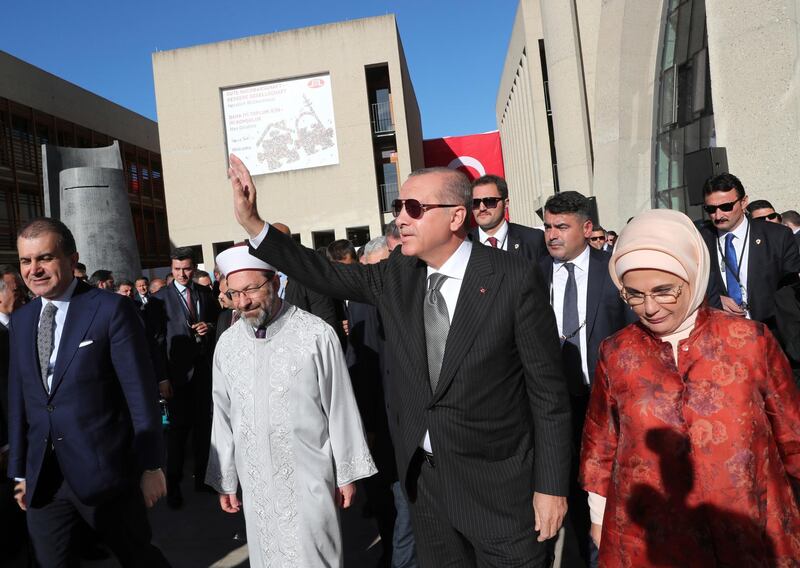Politicians, especially those who have spent many years in power, famously seek adulation abroad when the shine of their leadership begins to dull at home.
Recep Tayyip Erdogan, three months into his latest term as president but in his 15th year at the top of Turkish politics, is facing a continuing economic crisis, hosting millions of refugees, and has a civil war still raging in his backyard. Under those circumstances, he could be forgiven for hoping that a European trip might take his mind − and those of others − off his mounting domestic troubles.
If only. Mr Erdogan’s European tour has merely underscored the difficulties Turkey is having with western powers. His recent visit to Germany also demonstrated how his domestic woes are precisely what lie behind these tensions.
The most pressing concern for Turks is the country’s continuing currency crisis. The lira continues to crash against the dollar, losing half its value in just 12 months. That decline was made worse by President Donald Trump announcing in August that he was doubling import tariffs on Turkish steel and aluminium.
The economic meltdown Turkey is facing is not entirely of Mr Erdogan’s making, but his autocratic and nepotistic tendencies have made it worse.
First, he named his son-in-law as Turkey’s finance minister. Then he appointed himself chairman of the country’s sovereign wealth fund. In a photograph of the contract that was widely shared and mocked on social media, Mr Erdogan acts as nominator and nominee, and approves his own appointment. Such moves have negatively affected faith in the lira and made investors and markets jittery.
This excessive personal control over the country is exactly what angers his critics in the EU. In Germany, Mr Erdogan pressed the case for renewed movement on Turkey joining the EU. But with one man exerting such power over what would be the EU’s second largest state, it is understandable that the organisation’s leaders have concerns.
It also doesn’t help, of course, that Mr Erdogan is such a combative character.
A year ago, in the run-up to a constitutional referendum in April 2017, Germany stopped Mr Erdogan holding campaign rallies in German cities with substantial Turkish populations. His response was to accuse the country of “Nazi practices”.
Mr Erdogan has also taken a harsh tone with the US. The most divisive issue between the US and Turkey is the fate of Andrew Brunson, an American evangelical pastor under house arrest in Turkey for alleged links to Kurdish militants and the exiled Turkish cleric Fethullah Gulen. Mr Trump – an equally belligerent leader – has taken a personal interest in the case, after it caught the attention of his Christian base. The issue has become deeply personal and Mr Trump has explicitly threatened Turkey with sanctions if Mr Brunson is not released.
With the constitutional referendum of 2017 passed and Mr Erdogan elected to a new presidency in June with widely expanded powers, now should be a moment for him to start building bridges. In Germany he called on both countries to "set aside our differences of opinion".
Unfortunately, he also accused the Germans of harbouring terrorists, meaning supporters of the militant Kurdish group the PKK, which Germany designates as a terrorist organisation, and followers of Gulen, who it does not.
Mr Erdogan's crackdown on Gulen's followers and Kurdish militants have caused deep fissures within Turkey and the Turkish diaspora. In Germany, Mr Erdogan was met with rallies both for and against him.
But, for all these issues, he has one trump card: the migration crisis.
No other Nato country is shouldering such a large share of the burden of the Syrian war. Turkey hosts more refugees than any other nation, is stopping them reaching European countries, and has brokered a deal with Russia to halt an assault on Idlib.
For all their misgivings about Mr Erdogan, EU leaders clearly want him to continue doing the job. The fact is that the EU and Ankara need each other − and Germany, in particular, needs Mr Erdogan.
Angela Merkel, herself more than 12 years in power, only just managed to retain her chancellorship at the start of this year. She has also seen the noisily anti-immigration far-right party Alternative fur Deutschland become her main opposition. More than any other leader in Europe, she needs the Syrian migration crisis to be contained. Mr Erdogan has the power to do that.
Other European countries, too, prefer to imagine that the migration crisis does not exist, and that millions of refugees are not scattered across Europe and surrounding nations. The governments of Italy, Greece and even the UK, itself mere months away from leaving the EU, would rather talk about almost anything else.
In that respect, Mr Erdogan has more friends abroad than at home. On the ground in Turkey, and next door in Syria, the large refugee population and the war are live issues. The strain is being felt by ordinary Turks and the blame is passed upwards. Yet, when Mr Erdogan talks about the migration crisis in foreign capitals, he is praised for his efforts.
So, while his domestic woes may follow him around Europe – this week he is in Hungary, meeting Viktor Orban, a leader who has also had plenty of his own run-ins with the EU – Mr Erdogan still has at least one topic of conversation guaranteed to win him friends on foreign soil.





